Choose the right ration for chinchillas - responsible task. The state of health of the animal, the shine of fur and life expectancy completely depend on food.
Food for a rodent is very diverse, but there are characteristic features in how to feed a pet, especially at home.
Table of contents
What likes to eat chinchilla?
Chinchilla is a herbivore.The basis of the diet animals are feed of plant origin.
In the wild, the main food for them is cereals and legumes, cacti, bushes, tree bark, small fruits, shoots, mosses and other vegetation.
At home man is responsible for the diet of the animal. Food should be diverse and balanced to ensure that all the needs of the body with the necessary components, vitamins, nutrients.
Chinchilla important quality food. They eat in small quantities, so the owners of animals should carefully consider the choice of food.
You may be interested in the following chinchilla articles: How to keep chinchilla at home?
Moreover, luxurious fur and irrepressible energy require a lot of nutrient consumption. Chinchillas are picky about food. From the proposed food, they will choose the most tidbits.
But for the full development the animal needs to receive various microelements and vitaminstherefore, it is necessary to try so that the animal completely consumes its portion.
In case the pet began to scatter food from the feeder, it is necessary to reduce the food produced.You can give your pet food in small parts, to reduce in the diet of treats.
Choosing food for a rodent should be borne in mind that they, like all herbivores, have sensitive digestion.
First, they have a long intestine. Secondly, animal herbivores process hard-digestible cellulose plants. From it they get the necessary nutrients.
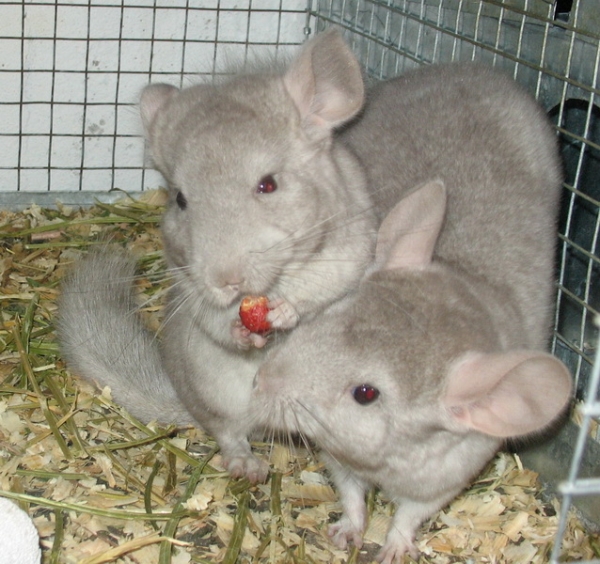
It is better not to feed the chinchilla a little, than to overfeed delicacies. The proposed food must be:
- quality;
- fresh;
- no traces and smell of rot, mildew, mustiness.
Green feed should be collected away from busy places, roadsides, factories. Greens, vegetables and fruits before feeding the rodent should be well washed and dried. The food offered must always be dry.
Young animals and those individuals that did not receive green fodder in the winter season should gradually get used to them. Initially, you need to offer your pet such food in small portions, gradually increasing the dose.
It is necessary to closely monitor the health of the chinchilla.
So the animals get used to the set feeding time, which has a positive effect on the digestibility of food. If in the morning all the food is eaten, then additional feeding is possible.
Before you pour your pet a new portion of food, you must throw out the uneaten residue and rinse the bowls with running water without adding detergents and cleaning products.
Daily portion of the main pet food - 1 tsp, hay - 20–30 g, a delicacy to choose from - 1 piece. In the drinking bowl of the animal should always be boiled or filtered clean water.
What can feed a rodent at home
The animal living in your home eats coarse dry and juicy food, nutritious mixtures, needs vitamin supplements and delicacies.
The food is rough and juicy
For juicy feed include fruits, vegetables, greens and twigs of bushes, trees. They are saturated with useful microelements, vitamins, organic substances.
Throughout the year, available branches, snags, twigs of various shrubs and tree species.Eating hard wood, the animals will grind the ever-growing incisors.
From vegetables, chinchillas can be offered tomatoes, celery, cucumbers, carrots, pumpkin, lettuce, zucchini.
From fruits they prefer pears, apples, melons, berries, bananas, grapes, from dried fruits - apples, plums, raisins, hawthorn, dried apricots, cherries, barberries and rosehips. Fruits of large size, it is desirable to cut into small pieces.
From the green is to give clover, carrot, pea, dandelion tops.
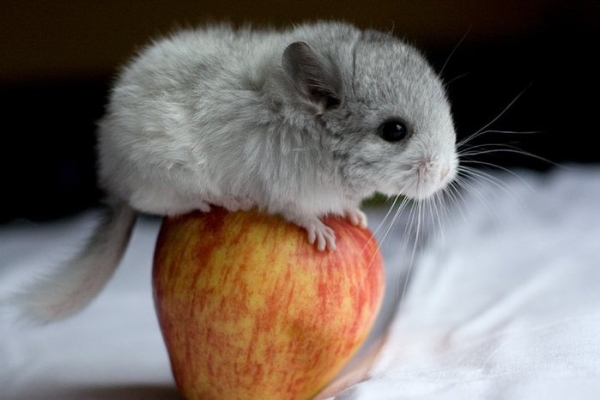
Treats should be offered systematically. For example, 1–2 times a week, one berry, 2–3 times a week, other sweets - fruits, dried fruits.
Vegetables should be fed in moderation - a small piece 1-2 times a week along with the main feed. Due to sensitive digestion, chinchillas cannot eat large quantities of vegetables and fruits.
After the introduction of a new type of food, you should carefully monitor the reaction of the organism of the animal. Perhaps a digestive disorder, then from the juicy feed should be abandoned. If the pet feels good, then the food came to him.
Food is dry and coarse.
Such food refers hay. It is the most important component of the animal diet and nourishes the body with essential fiber.
Dried grass helps to advance food in the intestine, preventing it from stagnating, causing fermentation. Also, hay is a rich source of trace elements, vitamins, fiber, protein.
Hay must be of good quality, fresh, not wet and not musty. Properly harvested food smells good, without extraneous garbage, sticks and other inclusions. It can be purchased at pet stores or assemble yourself.
Better when chinchilla is offered as food grass hay - different types of herbs. Preparations from leguminous plants (alfalfa, clover) contain the necessary vitamins and minerals. They are mown during the flowering of legumes.
The cereal feed in nutritional composition is slightly inferior to the first, because it contains less minerals and protein.
To cereal cropswho love chinchillas include meadow fescue, Sudanese, timothy grass, couch grass, bluegrass meadow grass, hedgehog team.Possess a large amount of nutritional value of herbs, beveled before the first flowering.
Chinchilla should be given per day from 20–30 to 70–80 g of fresh hay.
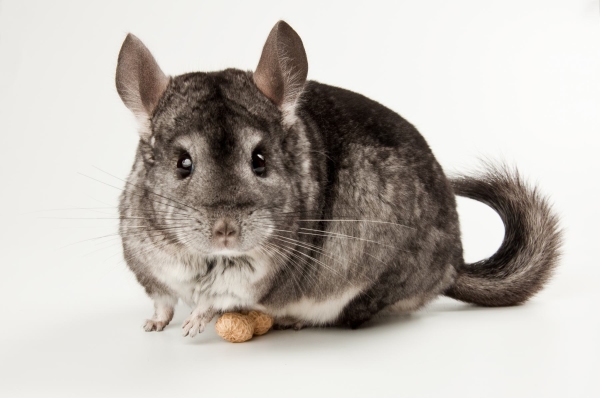
These herbs are poisonous. and in herbal food for animals should not be in any way:
- fern;
- horsetail;
- sitnik;
- black nightshade;
- dope
- hellebore white;
- knapweed;
- raven eye.
Do I need to give nutrients?
For the proper development of the rodent it needs the elements contained in the nutrient mixtures. Chinchillas should be given various mixtures in order to saturate their bodies with as many vitamins, microelements, proteins, fats, and amino acids as possible.
These types of food can be purchased at the pet store or make yourself. Most often they are sold in granular form. They contain all the necessary wholesome ingredients in the right proportions.
Of the crops rodents fit:
- oats - contains a large amount of protein, fat, but does not cause obesity. Most often, it is oats up to 75% of the mixture;
- corn - it is necessary to give in small portions, as it can cause bloating;
- barley - it is worthwhile to offer it in ground form, better for adults. This grain product is very hard;
- wheat - it contains a lot of carbohydrates, proteins, low in fat.
In feeding chinchillas worth refusing rye - it is hard digested by animals.
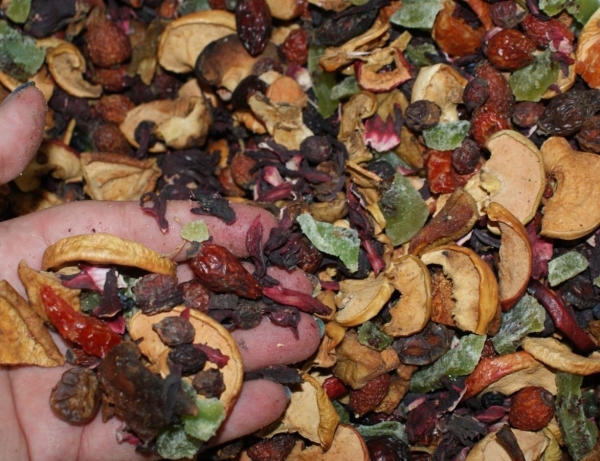
What kind of feed can not eat chinchilla?
Due to sensitive digestion of chinchillas they should not give the following products:
- food from the common table (salted, spicy, fatty, spicy, smoked);
- meat and meat products;
- bakery products and muffins (bread, pastries);
- flour (pasta, noodles);
- potatoes, fresh white cabbage, lettuce leaves;
- sweets (cookies, chocolate, sugar, candy, other confectionery);
- eggs;
- roasted nuts, seeds, grains;
- mushrooms;
- dairy products;
- fast food, chips, popcorn;
- stale and spoiled food.
The list contains absolutely no useful substances for the proper growth and development of the rodent. These foods are high-calorie and fatty, with the result that your pet may develop obesity.
This will adversely affect the mobility of the animal., his ability to reproduce, life expectancy.
Perhaps, from one eating the animal will not die, but systematic consumption of such delicacies will lead to serious health problems of chinchilla.
Vitamin supplements in addition to nutrition
With an unbalanced diet of chinchillas, young individuals, pregnant and lactating rodents, sick and weakened it is necessary to give vitamin complexes. They can be in liquid form, in the form of tablets and powders.
Liquid fortified feed can be given along with water, so it will not be difficult to enrich the pet's diet. It is hard to offer powders and tablets to pets.
In the cage of the animal is desirable hang mineral and salt stonewhich the animal will eat as needed.
You can buy immediately fortified feed. The composition most often listed as carrots, pumpkin, nettles hay, mountain ash, wild rose. To replenish the reserves of protein and vitamins of group B, it is worth pouring some dry yeast into the feed (2–5 g).
Chinchilla to accustom to proper nutrition is not difficultbut necessary.Only by getting all the beneficial microelements, vitamins and other useful compounds the animal will be healthy, full of energy and live a long life.
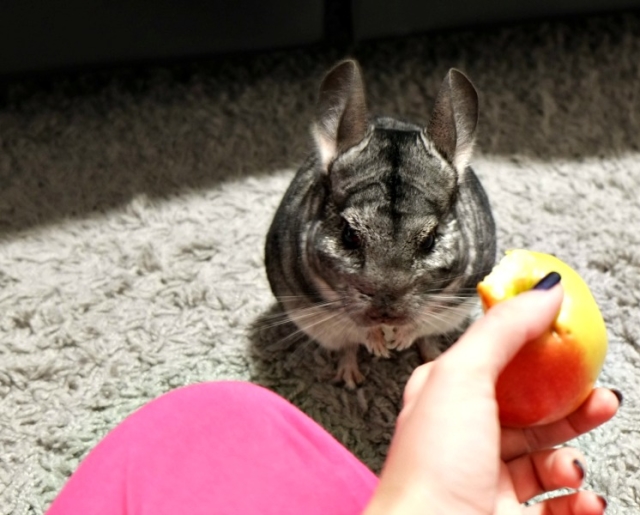
I watched the video, just this girl shocked me! Remember, please, that chinchillas should not be given cherries in any case, feed should be for chinchillas, because other feeds may contain protein products (meat) that are strictly forbidden to chinchillas, and also sunflower seeds cannot be given !!!